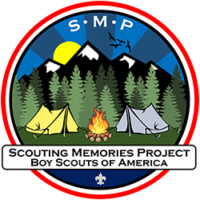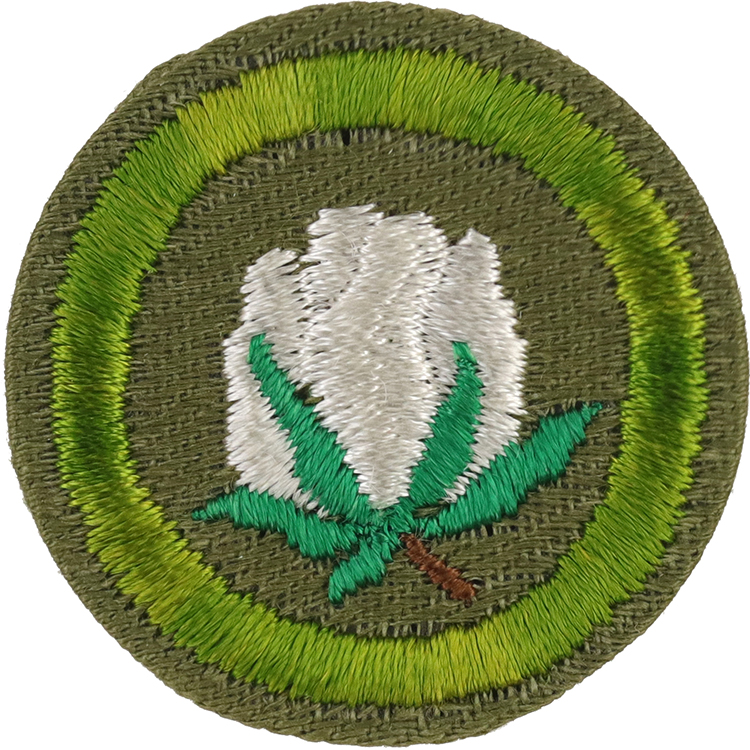
Fig. 1: CotFar-E2-Front
- Cloth: Khaki right twill
- Embroidery: Cotton lock stitch
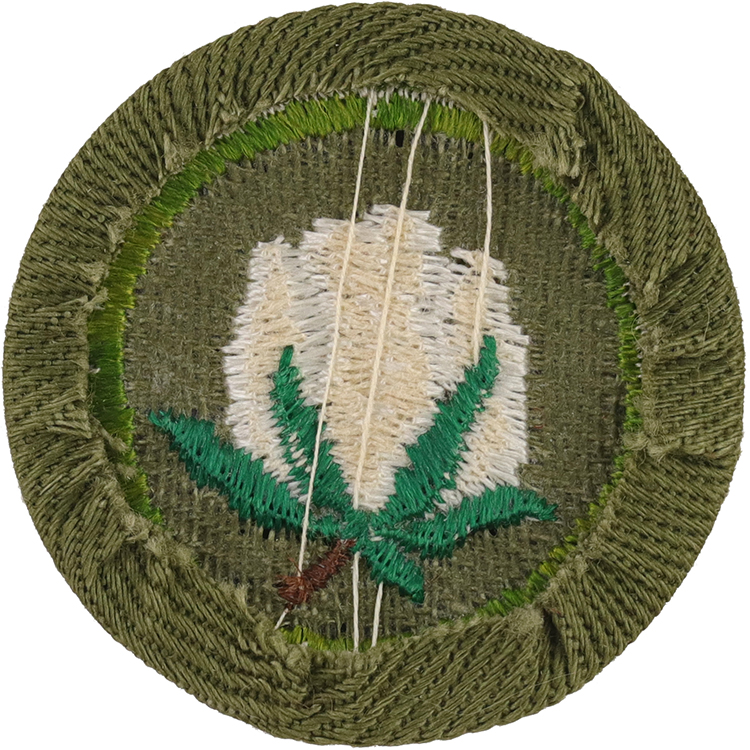
Fig. 2: CotFar-E2-Reverse
- Back: Plain NO imprint with starch
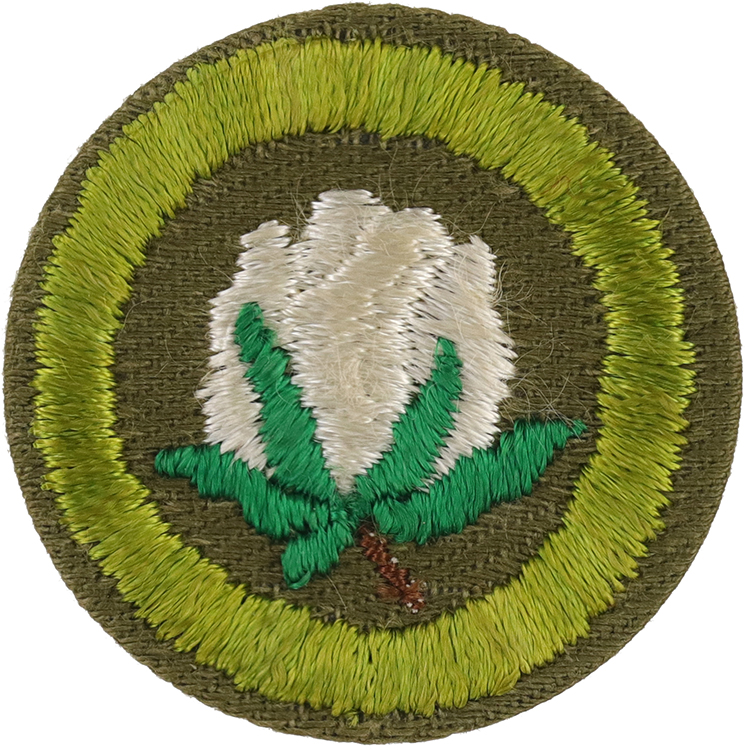
Fig. 3: CotFar-E2-mve1-front
- Minor variation: Wide light border
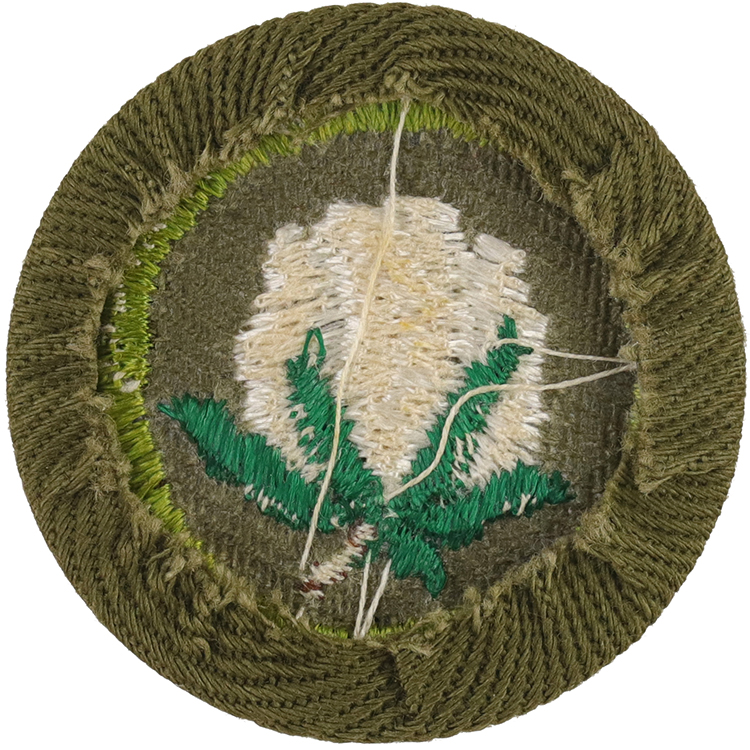
Fig. 4: CotFar-E2-mve1-reverse
- Back: Plain NO imprint with starch
Item Name: Cotton Farming 1947 - 1960
Item ID: CotFar-E2
Collector Rating: 1
Requirements March 1931 until June 1948
1. On a map of the United States block in the sections where cotton is successfully grown.
2. Grow a patch of cotton successfully on the basis of instructions given by the County Agent representing the United States Department of Agriculture and his State College of Agriculture.
3. Demonstrate how to test cotton seed for vitality.
4. Give the domestic and commercial uses of cotton and cotton seed; name some of the more important by-products.
5. Name the more important insect pests that damage cotton, and give recommendations as to prevention and control of same.
6. Name the important cotton plant diseases and explain full control measures for each.
7. By arrangement with the owner of a cotton plantation, take part in four operations in connection with a cotton crop and explain fully how he did the work.
8. Make a written report from personal observation on a cotton gin in action and on the conditions and operations of the nearest local cotton market.
9. Demonstrate how he would detect cotton goods made from long staple cotton.
10. Draw a plan for a moderate sized cotton plantation, showing field layouts and plan for 3 or 4 years rotation of crops with the cotton.
OR
Comply with the 4-H Club or Home Project requirements in Cotton Farming as follows:
1. Own a plot of cotton and do the work as required by state and county leaders.
2. Do all the work in its care and management.
3. Keep accurate record of costs and results.
4. Exhibit products as required by state and county leaders in charge.
5. Make a complete report at the end of season or year, as required by leaders.
Requirements June 1948 until January 1957
1. On a map of the United States block in the sections where cotton is successfully grown.
2. Grow a patch of cotton successfully on the basis of instructions given by the County Agent representing the United States Department of Agriculture and his State College of Agriculture.
3. Demonstrate how to test cotton seed for vitality.
4. Give the domestic and commercial uses of cotton and cotton seed; name some of the more important by-products.
5. Name the more important insect pests that damage cotton, and give recommendations as to prevention and control of same.
6. Name the important cotton plant diseases and explain full control measures for each.
7. By arrangement with the owner of a cotton plantation, take part in four operations in connection with a cotton crop and explain fully how you did the work.
8. Make a written report from personal observation on a cotton gin in action and on the conditions and operations of the nearest local cotton market.
9. Demonstrate how you would detect cotton goods made from long staple cotton.
10. Draw a plan for a moderate sized cotton plantation, showing field layouts and plan for 3 or 4 years rotation of crops with the cotton.
OR
Comply with the 4-H Club or Home Project requirements in Cotton Farming.
Requirements January 1957 until June 1972
1. On a map of the United States block in the sections where cotton is successfully grown.
2. Grow a patch of cotton successfully on the basis of instructions given by the County Agent representing the United States Department of Agriculture and his State College of Agriculture.
3. Demonstrate how to test cotton seed for vitality.
4. Give the domestic and commercial uses of cotton and cotton seed; name some of the more important by-products.
5. Name the more important insect pests that damage cotton, and give recommendations as to prevention and control of same.
6. Name the important cotton plant diseases and explain full control measures for each.
7. By arrangement with the owner of a cotton plantation, take part in four operations in connection with a cotton crop and explain fully how you did the work.
8. Make a written report from personal observation on a cotton gin in action and on the conditions and operations of the nearest local cotton market.
9. Demonstrate how you would detect cotton goods made from long staple cotton.
10. Draw a plan for a moderate sized cotton plantation, showing field layouts and plan for 3 or 4 years rotation of crops with the cotton.
This merit badge may be earned as a 4-H'er by completing a club project in that subject or as an FFA member by meeting these requirements through the FFA supervised farming program.
2. Grow a patch of cotton successfully on the basis of instructions given by the County Agent representing the United States Department of Agriculture and his State College of Agriculture.
3. Demonstrate how to test cotton seed for vitality.
4. Give the domestic and commercial uses of cotton and cotton seed; name some of the more important by-products.
5. Name the more important insect pests that damage cotton, and give recommendations as to prevention and control of same.
6. Name the important cotton plant diseases and explain full control measures for each.
7. By arrangement with the owner of a cotton plantation, take part in four operations in connection with a cotton crop and explain fully how he did the work.
8. Make a written report from personal observation on a cotton gin in action and on the conditions and operations of the nearest local cotton market.
9. Demonstrate how he would detect cotton goods made from long staple cotton.
10. Draw a plan for a moderate sized cotton plantation, showing field layouts and plan for 3 or 4 years rotation of crops with the cotton.
OR
Comply with the 4-H Club or Home Project requirements in Cotton Farming as follows:
1. Own a plot of cotton and do the work as required by state and county leaders.
2. Do all the work in its care and management.
3. Keep accurate record of costs and results.
4. Exhibit products as required by state and county leaders in charge.
5. Make a complete report at the end of season or year, as required by leaders.
